Natural Gas Safety
Natural gas is combustible... learn how to use it safely
Natural gas is one of the safest fuels. Composed mostly of methane, it is naturally colourless and odourless. For safety's sake, an odour is added - a smell like rotten eggs or sulphur - so you can easily detect it. When natural gas leaks it will mix with air and can cause a fire if there is a source of ignition (or explosion if it accumulates in a confined space). Natural gas is not poisonous but can cause unconsciousness in high concentrations when it displaces air.
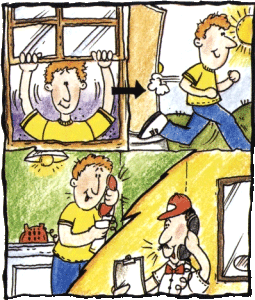 |
| Smell gas... act fast! |
SMELL GAS - ACT FAST
If you think that you smell natural gas indoors
- Open doors and windows
- Do not smoke, light matches, operate electrical switches or create any other source of ignition
- Leave the premises
- Turn off your gas meter, if you know how
- Go to a nearby phone and call your natural gas utility, 911, or Fire Department emergency number.
If there is a strong smell of gas, if you hear the flow of escaping gas, or if gas is leaking from a broken or disconnected gas pipe, do the following:
- Leave the premises
- Go to a nearby phone and call your natural gas utility, 911 or Fire Department emergency number.
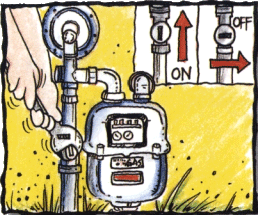 |
| Know how to turn off gas supply |
In an emergency, can I shut off my gas supply at the meter?
Yes. If it is necessary to turn off your gas supply before the gas utility or Fire Department arrives, you should know the proper procedure. Give the valve a quarter turn in either direction so that the lever is crosswise to the pipe.
Can I turn the meter on again?
Leave it to an expert! Once the gas is turned off, it should be turned back on by a qualified individual who can check out the appliances and venting.
WINTER PREPARATIONS
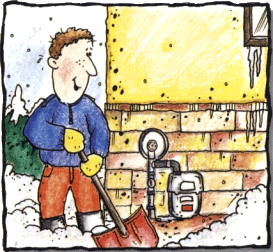 |
| Keep meter clear! |
- Service your appliances in the summer to minimize problems during the heating season.
- Check that chimneys or vents are not blocked, so that products of combustion can flow to the outside.
- Keep combustion air inlets clear. Air is required for safe combustion and proper vent operation.
- Keep the meter clear of snow and ice.
- Do not shovel snow up against the meter.
- Take care in using a snow blower or plow near your meter.
- Keep eavetroughs clear and in good repair so that water does not drip on the meter and cause ice build-up on your gas meter or piping.
Accumulated snow and ice places stress on your meter piping. Damage to the piping can cause a gas leak. Blocked regulator vents can dangerously over-pressure the system, affect appliance operation, and interrupt service.
REMEMBER MAINTENANCE
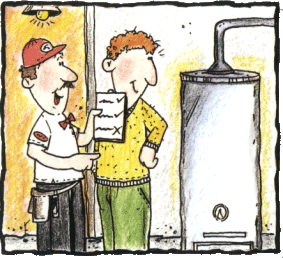 |
| Have regular inspections and maintenance! |
Refer to the manuals provided with your appliances. They contain operating and maintenance instructions. Have a Gas Contractor check your appliances, vents and combustion air openings regularly to ensure safe and reliable operation. Some appliance manufacturers recommend annual inspection and maintenance. During the visit, ask if your water heater has been secured as a precaution for earthquakes.
Vents or chimneys must be kept clear to allow the products of combustion to go outside. Products of combustion can contain carbon monoxide. See Carbon Monoxide Safety.
If you or a member of your family has concerns about your ability to smell natural gas, consider the purchase of a methane gas alarm. But remember, while an alarm may provide an extra measure of warning, they should never be relied upon as a substitute for regular inspection and maintenance of natural gas appliances.
GAS METER TIPS
- Know where your meter is
- Keep it clear for emergency responses
- Know how to shut off your gas at the meter
- Keep a wrench in a convenient location
- Do not enclose your meter
- Do not tie pets or other objects to the meter or outside gas pipes
CALL BEFORE YOU DIG
Underground pipes bring natural gas to your house. If you are making an addition, doing major landscaping, or installing fence posts always `Call Before You Dig!' Call 1-800-474-6886 or *6886 on your cellular to find out the location of underground pipes and visit http://www.bconecall.bc.ca/ for more information.
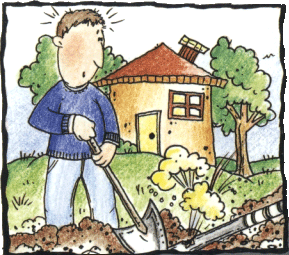 |
| Call before you dig |
| Sponsored By: | ||||
 |
 |
 |
 Insurance InsuranceBrokers Association |
 |
| Greater Vancouver Fire Chiefs Association Public Education Committee | ||||
